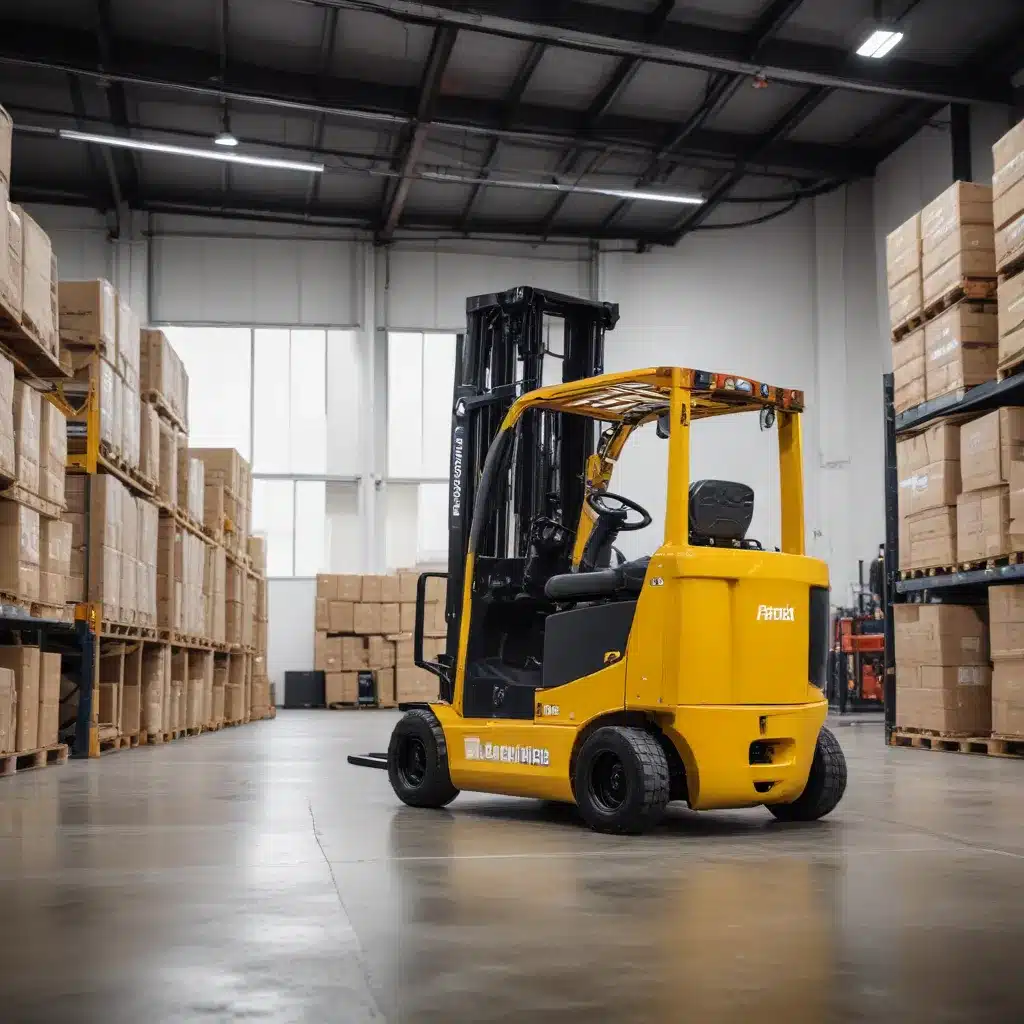
The Forefront of Forklift Technology
As a seasoned industry expert in forklifts, warehousing, and logistics, I’m thrilled to share insights on the transformative power of electric forklifts and their role in driving sustainability within the industry. The world of material handling is undergoing a remarkable shift, with electric forklifts emerging as the frontrunners in powering a more eco-friendly and efficient future.
Electric forklifts have long been touted as the greener alternative to their conventional, fuel-powered counterparts, and for good reason. These innovative machines offer a host of benefits that are revolutionizing the way businesses approach logistics and warehouse operations. From enhanced energy efficiency to reduced environmental impact, electric forklifts are leading the charge towards a more sustainable future.
Embracing Energy Efficiency
One of the primary advantages of electric forklifts is their exceptional energy efficiency. Unlike their diesel or propane-powered counterparts, electric forklifts utilize advanced battery technology and regenerative braking systems to minimize energy consumption. This not only translates to lower operating costs for businesses but also significantly reduces their carbon footprint.
By harnessing the power of electricity, electric forklifts can perform their material handling tasks with remarkable efficiency, often outpacing their combustion-engine counterparts in terms of energy usage and runtime. This efficiency extends beyond the forklifts themselves, as businesses can leverage renewable energy sources, such as solar power, to further enhance the sustainability of their operations.
Reducing Environmental Impact
The environmental benefits of electric forklifts extend far beyond their energy efficiency. These machines produce zero direct emissions, eliminating the release of harmful pollutants and greenhouse gases associated with traditional forklift models. This shift towards a zero-emission material handling solution is a crucial step in the industry’s journey towards sustainable logistics.
As businesses and consumers alike become increasingly mindful of their environmental impact, the adoption of electric forklifts aligns perfectly with the growing demand for eco-friendly practices. By embracing this technology, logistics companies can demonstrate their commitment to sustainability, appealing to environmentally conscious customers and contributing to the global efforts to combat climate change.
Enhancing Workplace Safety
In addition to their environmental advantages, electric forklifts also offer enhanced safety features that benefit both operators and the surrounding workforce. With their quieter operation and lack of exhaust fumes, electric forklifts create a more pleasant and safer work environment, reducing the risk of accidents and improving overall employee well-being.
Moreover, the precision and responsiveness of electric forklift controls can lead to smoother, more controlled movements, further enhancing workplace safety. This level of control, combined with the reduced noise levels, can also contribute to improved communication and collaboration among warehouse teams, fostering a more collaborative and productive work environment.
Adapting to Industry Trends
As the logistics industry continues to evolve, electric forklifts are not only meeting but also shaping the demands of the modern marketplace. With the rise of e-commerce and the increasing emphasis on just-in-time delivery, the need for efficient, agile, and sustainable material handling solutions has become paramount.
Electric forklifts, with their ability to operate in confined spaces, navigate tight corridors, and maneuver with precision, are well-suited to the demands of today’s warehousing and distribution environments. Their adaptability and technological advancements align seamlessly with the industry’s drive towards automation, robotics, and data-driven decision-making.
Investing in the Future
Recognizing the transformative potential of electric forklifts, leading companies in the logistics and warehousing sectors are increasingly investing in this technology. Businesses such as Farralls and Amazon are at the forefront of this shift, integrating electric forklifts into their operations and adopting complementary sustainable practices, such as solar power and electric vehicle fleets.
These forward-thinking investments not only enhance the environmental performance of these companies but also position them as industry leaders, setting new standards for sustainability and innovation. By leading the charge in the adoption of electric forklifts, these organizations are paving the way for a more sustainable future in logistics.
Empowering the Future with Electric Forklifts
As we look to the future, the role of electric forklifts in powering logistics innovation and driving sustainability is only set to grow. Advancements in battery technology, energy storage systems, and automation will further enhance the capabilities and appeal of these eco-friendly material handling solutions.
The integration of artificial intelligence, advanced sensors, and predictive maintenance will elevate electric forklifts to new heights, offering greater efficiency, safety, and adaptability to the ever-changing demands of the logistics industry. By embracing these cutting-edge technologies, businesses can future-proof their operations and solidify their position as leaders in sustainable logistics.
Conclusion: Embracing the Electric Forklift Revolution
In the dynamic world of logistics and warehousing, electric forklifts stand as a beacon of innovation and environmental responsibility. By harnessing the power of electricity and embracing sustainable practices, these remarkable machines are transforming the industry, paving the way for a greener, more efficient, and safer future.
As we continue to navigate the evolving landscape of logistics, the adoption of electric forklifts will be a crucial step in the industry’s journey towards a more sustainable and resilient tomorrow. By investing in this technology and incorporating complementary sustainable initiatives, businesses can not only enhance their operational performance but also make a meaningful contribution to the global efforts to combat climate change.
The future of logistics is electric, and the time to embrace this revolution is now. By empowering our warehouses and distribution centers with the innovative prowess of electric forklifts, we can unlock a new era of sustainability, efficiency, and industry-leading excellence. Join us in powering the future of logistics and driving the change we wish to see in the world.

